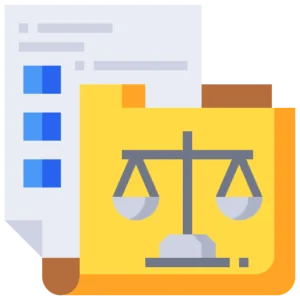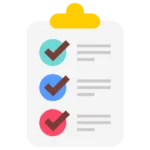▷ See all Step-by-Step Guides.
Find out in 8 steps how to prepare for your asylum interview. A quick overview:
- Write down important dates, collect evidence, and practice for the interview.
- Get support from counseling centers or lawyers.
- Ask for an interpreter. Take your time when answering during the interview.
Click on headlines to open steps
- For more information, click on the small numbers.1Example
1. Inform yourself about the interview

- If you have applied for asylum, you will be invited to a interview2The interview is a meeting with a person from BAMF (Federal Office for Migration and Refugees) who will decide on your asylum application. The meeting can last several hours.. During this meeting, you will explain the reasons for your flight. What you say during the interview is very important for your asylum process. Everything you do not say or show during the hearing may not be considered later.
- You will get the invitation to the interview and the exact date3Make sure to go to the interview, otherwise your asylum application might be rejected. If you are sick, you must call the same day to cancel and send a doctor’s note (“Attest”) to BAMF., usually in a yellow envelope.4Letters sent by “formal delivery” usually come in a yellow envelope. The letter will say “Invitation to the interview.” The interview can be soon after you arrive or several months later. Often, there first is a conversation about your escape route.5In this conversation (sometimes called a Dublin interview), they will ask if you were in other European countries before. It is not the interview about the reasons for your flight.
- Prepare for the interview as early as possible, even if you haven’t received an invitation yet.6Read the information from Handbook Germany and BAMF. Here you can find information about the interview in many different languages.
2. Write down your experiences and why you fled

- Create a document7This document is for your preparation. You should not use it during the interview but instead answer the questions from memory. with important details and your reasons for fleeing.
-
Write down what happened before you fled, when you left your country, and how your flight went, in chronological order. Note down places and times as accurately as possible8If you are unsure about a place or date, note that you are not sure.. Write why you fled and what would happen if you had to return to your country of citizenship.
- Collect evidence related to your reasons for fleeing (newspaper articles, Facebook posts, medical certificates, letters from authorities).9If you receive evidence later, explain why in the interview and say that you will send it later.
- If family members have already applied for asylum, you should discuss your statements to make sure they do not contradict each other.
3. Get support

-
We recommend getting support for your preparation. Find a counseling center or asylum procedure advice (Asylverfahrensberatung)10Search for counseling centers on this page. Filter by state, the advice topic “asylum procedure,” and your language. You can also use the BAMF map for your search. to get free help.
- You can also ask the social workers at your accommodation and associations (Vereine) or NGOs for help.
4. Maybe ask a lawyer for help

-
If you also get help from a lawyer, it can improve your preparation. Plan to spend €250 to €700. Find out here how to find a law office.
- If you come from a country with a low rate of asylum recognition11You can see the rate of protection granted per country in 2022 here (pages 3 and 4). The following countries are considered safe countries of origin: Albania, Bosnia and Herzegovina, Georgia, Ghana, Kosovo, North Macedonia, Montenegro, Moldova, Senegal, and Serbia., it is especially recommended to get help from a lawyer.
- If you are unsure how to describe your reasons for fleeing, a lawyer can help. This is especially important if you fled because of your sexual orientation or religious conversion.
5. Practice for the interview

- Once you have written down your reasons for fleeing, you should practice for the interview. Ask your friends or contacts to help.
- Here you can find possible questions that might be asked. Have someone read the questions to you and answer them.
- The most important question is about the reasons why you had to leave your home country and the chronological order of your flight. Practice reporting this freely.12After practicing, you should be able to explain everything from memory without the document. Your friend should interrupt you with questions from time to time. If you don’t remember something exactly, say so instead of making something up.
6. Find someone to accompany you to the interview

- If you have someone you know who can come with you to the interview, you might feel safer. If possible, find someone who speaks both German and your native language. They can help ensure that everything you say is translated correctly.
-
Before the interview, write a letter13“Sehr geehrte Damen und Herren, hiermit möchte ich Sie darüber informieren, dass mich (Vorname, Name, Geburtsdatum, Adresse deines Freundes) zur Anhörung am (Datum) in (Ort) begleiten wird. Mit freundlichen Grüßen, (Dein Name, deine Adresse, das Aktenzeichen)” (English: “Dear Sir or Madam, I would like to inform you that (First Name, Last Name, Date of Birth, Address of your friend) will accompany me to the interview on (Date) in (Location). Kind regards, (Your Name, Your Address, File Number)” to the BAMF with the details of the person who will accompany you.
7. Request an interpreter

- At the interview, you have the right to an interpreter for your native language. We recommend this even if you speak German or English.
- Before the interview, write a letter14“Sehr geehrte Damen und Herren, hiermit möchte ich Ihnen mitteilen, dass ich für meine Anhörung am (Datum) um (Uhrzeit) in (Ort) eine Dolmetscher in der Sprache (deine Muttersprache) benötige. Vielen Dank und mit freundlichen Grüßen, (Dein Name)” (English: “Dear Sir or Madam, I would like to inform you that I need an interpreter in (your native language) for my interview on (Date) at (Time) in (Location). Thank you and kind regards, (Your Name)” to the BAMF, requesting an interpreter.15Be specific about your native language. For example, if you come from Syria, you need an interpreter for the Syrian dialect of Arabic.
- Before the interview, you can also inform the BAMF in written form about the preferred gender of the person conducting the interview.16 Among others, unaccompanied minors, those persecuted due to gender, torture victims, traumatized individuals, and victims of human trafficking can also request a specialized interview officer. This person has received special training.
8. Go to the interview prepared

- Make sure to attend the interview, otherwise your asylum application might be rejected. If you are ill, you must cancel by phone on the same day and send a medical certificate (document) to the BAMF.
- The interview can take a long time. Bring something to drink and eat. If you need a break, let them know.
- Try to answer all questions accurately. Also, show any documents you have and mention that you will submit additional documents if you do not have them yet.
- Take the time you need for your answers.17If you are told to wrap up, still report everything you want to say.
- The most important question is why you had to leave your home country. Unfortunately, this question is often asked very late, when you may already be exhausted. Nevertheless, try to explain in a calm way what happened to you before you fled and explain the reasons for your flight and give as many details as possible. If you cannot remember something exactly, just say so.
- If you do not understand something, ask for clarification. If you have problems with the interpreter, say so immediately and have it noted in the protocol. If you need to stop the hearing because of this, make sure it is also mentioned in the protocol. Don’t be intimidated, and insist on your right that the hearing can only happen with someone who speaks your language well.
- Your statements will be written down in a protocol in German. At the end, you will be asked if you would like the protocol to be translated orally. Do not skip this option, as the translation can clarify misunderstandings. Check if all the sentences are correct. Sign only if everything is correct.
This page was realized with the support of the Postcode Lottery and lawyer Nora Ebeling (Last updated October 2024).
▷ View all step-by-step guides.
▷ Get in touch with us.
Fußnoten
- 1Example
- 2The interview is a meeting with a person from BAMF (Federal Office for Migration and Refugees) who will decide on your asylum application. The meeting can last several hours.
- 3Make sure to go to the interview, otherwise your asylum application might be rejected. If you are sick, you must call the same day to cancel and send a doctor’s note (“Attest”) to BAMF.
- 4Letters sent by “formal delivery” usually come in a yellow envelope. The letter will say “Invitation to the interview.”
- 5In this conversation (sometimes called a Dublin interview), they will ask if you were in other European countries before. It is not the interview about the reasons for your flight.
- 6Read the information from Handbook Germany and BAMF. Here you can find information about the interview in many different languages.
- 7This document is for your preparation. You should not use it during the interview but instead answer the questions from memory.
- 8If you are unsure about a place or date, note that you are not sure.
- 9If you receive evidence later, explain why in the interview and say that you will send it later.
- 10
- 11You can see the rate of protection granted per country in 2022 here (pages 3 and 4). The following countries are considered safe countries of origin: Albania, Bosnia and Herzegovina, Georgia, Ghana, Kosovo, North Macedonia, Montenegro, Moldova, Senegal, and Serbia.
- 12After practicing, you should be able to explain everything from memory without the document.
- 13“Sehr geehrte Damen und Herren, hiermit möchte ich Sie darüber informieren, dass mich (Vorname, Name, Geburtsdatum, Adresse deines Freundes) zur Anhörung am (Datum) in (Ort) begleiten wird. Mit freundlichen Grüßen, (Dein Name, deine Adresse, das Aktenzeichen)” (English: “Dear Sir or Madam, I would like to inform you that (First Name, Last Name, Date of Birth, Address of your friend) will accompany me to the interview on (Date) in (Location). Kind regards, (Your Name, Your Address, File Number)”
- 14“Sehr geehrte Damen und Herren, hiermit möchte ich Ihnen mitteilen, dass ich für meine Anhörung am (Datum) um (Uhrzeit) in (Ort) eine Dolmetscher in der Sprache (deine Muttersprache) benötige. Vielen Dank und mit freundlichen Grüßen, (Dein Name)” (English: “Dear Sir or Madam, I would like to inform you that I need an interpreter in (your native language) for my interview on (Date) at (Time) in (Location). Thank you and kind regards, (Your Name)”
- 15Be specific about your native language. For example, if you come from Syria, you need an interpreter for the Syrian dialect of Arabic.
- 16Among others, unaccompanied minors, those persecuted due to gender, torture victims, traumatized individuals, and victims of human trafficking can also request a specialized interview officer. This person has received special training.
- 17If you are told to wrap up, still report everything you want to say.
